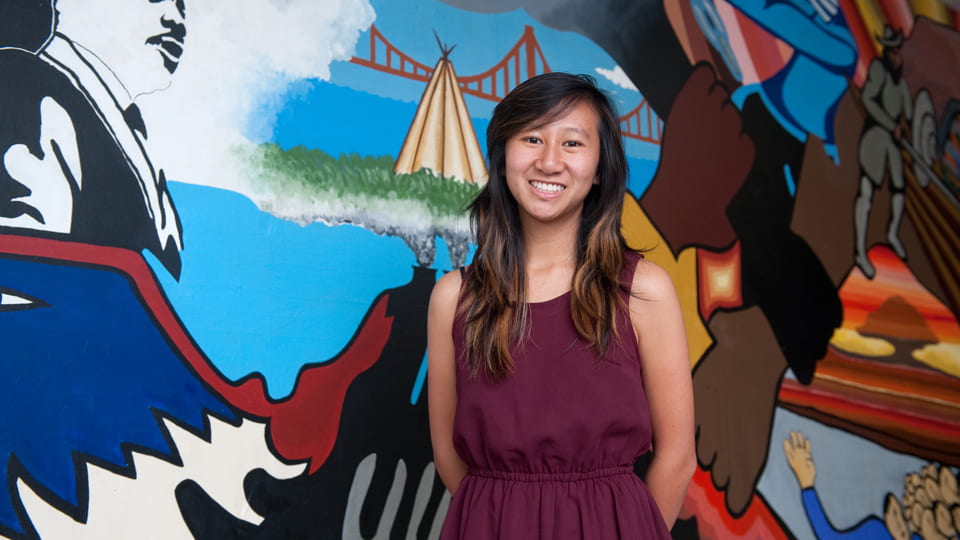UCI's top junior
Aldrich Scholarship recipient Amy He makes social sciences – and her single, immigrant mom – proud

Very few teenagers would trade a 15-minute commute to high school for a 75-minute bus ride. Even fewer would voluntarily study late into each night. But UCI sociology and education sciences major Amy He, the 2015 Dan & Jean Aldrich Scholarship recipient, willingly took on such challenges.
This dedication to her studies is one reason that School of Social Sciences faculty members nominated He for the prestigious scholarship, awarded to one junior each year based on academic excellence, campus involvement, community service and leadership.
Intelligent and ambitious, He has earned 20 “A+” grades since arriving at UCI and hopes to forge a career helping poor and minority students succeed. But she’s also humble and quick to credit others – especially her mother – for her success.
A special bond
He has always been close to her mother, who emigrated from a farm in rural China before she was born and raised her – alone – in Visitacion Valley, near San Francisco. With virtually no education and in a country where she did not speak the language, He’s mother took a job as a janitor at a high-end salon, a position she’s held for 15 years.
He grew up hearing about life in China and how her mother had been forced to quit school after fourth grade to take care of her younger siblings. These stories and her mother’s unwavering support motivated He to pursue the highest-quality education. She decided to attend a well-reputed high school in the affluent Pier 39 area of San Francisco – a 75-minute bus trip from the modest home she shared with her mother, aunt, uncle and cousins.
The commute took He from poverty-stricken Visitacion Valley to wealthy North Beach, opening her eyes to the effects of economic disparity. At her new school, she found teachers who allowed her to stay late and study, since her mother couldn’t help her with homework. The experience sparked her desire to reform the system so that disadvantaged students could access high-quality education just like their better-off peers.
While still in high school, He paid a visit to UCI, where her cousin was a student. The trip was enough to make her fall in love with the campus, and she set her sights on becoming an Anteater. Though it meant moving far away from her mom, she was thrilled and humbled to be accepted.
“Being low-income and getting to go to college is a privilege in itself, and I made it to UCI because a lot of people helped get me here. It’s not just because I worked hard,” He says. “I have a supportive mother, and I had teachers that cared about me enough to introduce me to programs that I could get involved in. I feel like a lot of kids – if they had that extra push – could make it to college as well.”
An active Anteater
In her second year at UCI, He discovered her passion for sociology, in particular theories about society, stereotypes and the oppression of certain groups. One of her favorite courses was on multicultural education, in which she learned why schooling is so difficult for students with backgrounds like hers.
“These students don’t see the purpose in school from very early on,” He says. “There’s a social contract between students and teachers in which students give up their freedom at school to receive a satisfactory education. However, when the social contract is broken – a school fails to deliver a fair and quality education – students see no reason to follow the directions set out by the teacher.”
In another class, she examined the learning habits of second-generation immigrants and why they typically strive for good grades. The answer didn’t surprise her.
“It’s because they have this dual frame of reference where they connect with their immigrant parents who work so hard and sacrifice so much so they can do well,” He says. “And I definitely feel that way about my mom. I want to make myself proud, but I also want to make her proud because she works so hard so that I can be here.”
She has taken advantage of extracurricular opportunities to learn about minority groups while having fun and making friends. Her favorite was the UCI Alternative Break Program, which she became involved with during her freshman year, when she signed up to visit a Native American reservation in California. As a sophomore, she interned with the organization, helping plan service trips to Arizona and Los Angeles to study immigration policy, homelessness and poverty.
“It’s a unique opportunity,” He says. “You feel like an adult. You’re in charge of planning activities and calling organizations to ask if we can volunteer with them. I could never have imagined myself doing something so big and important to me.”
This summer, she began exploring more options by working with Breakthrough San Juan Capistrano, a free program that provides enriching classes and extracurricular activities for low-income, high-achieving middle and high school students. As an intern teacher, He built lesson plans, taught pre-algebra and an elective course, and made connections with her students – many of whom will be the first in their families to attend college.
“I want to create something for students where they love to learn, where they see the purpose in learning,” she says.
Between her volunteer efforts, extracurricular activities and schoolwork, she sometimes feels stretched thin. He says that’s when she hears her mother telling her: “You can do it. It’s supposed to be hard.”
“She’s been saying that since I was in kindergarten,” He says, “and it makes sense. I’m just getting older, and things are getting harder, and that’s OK.”